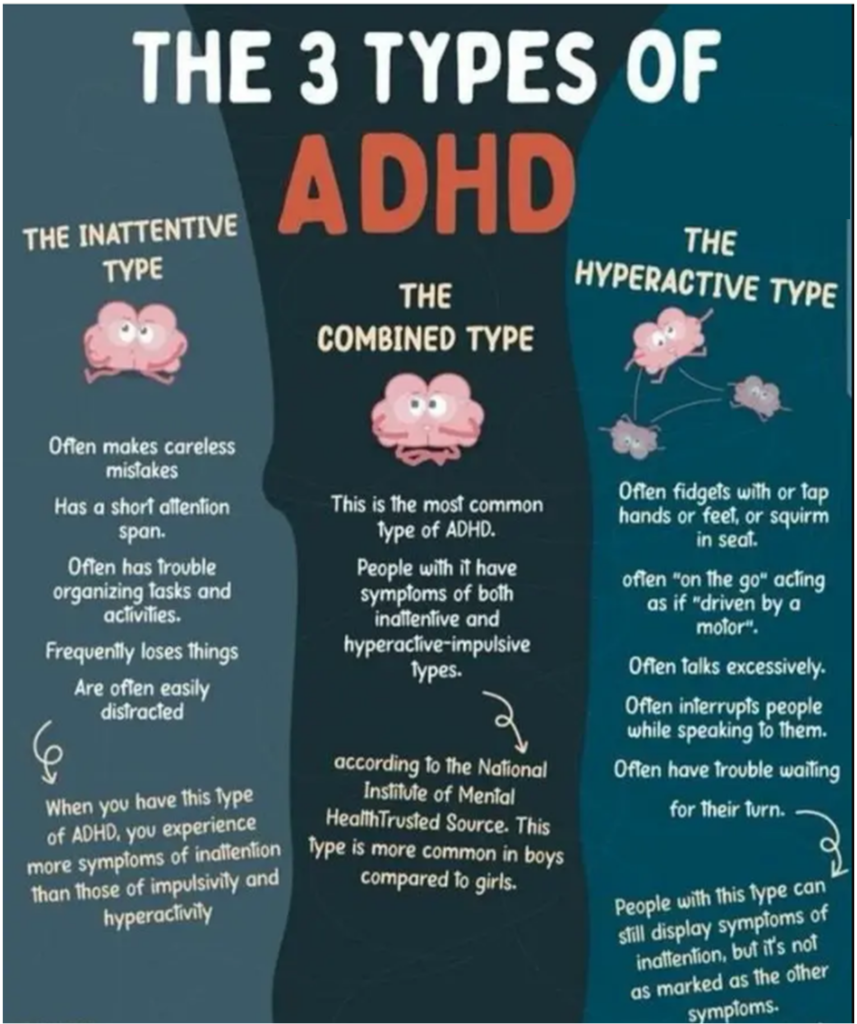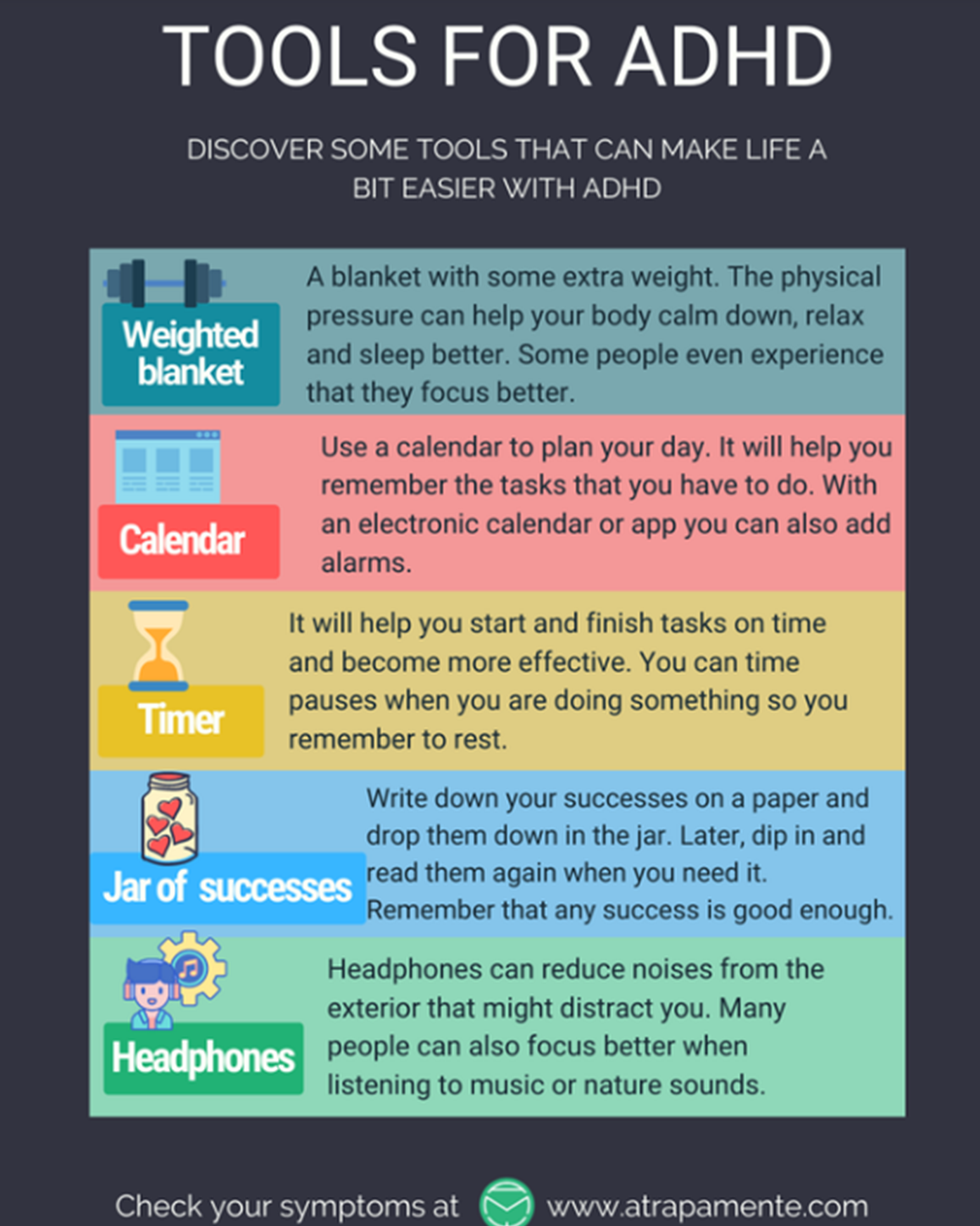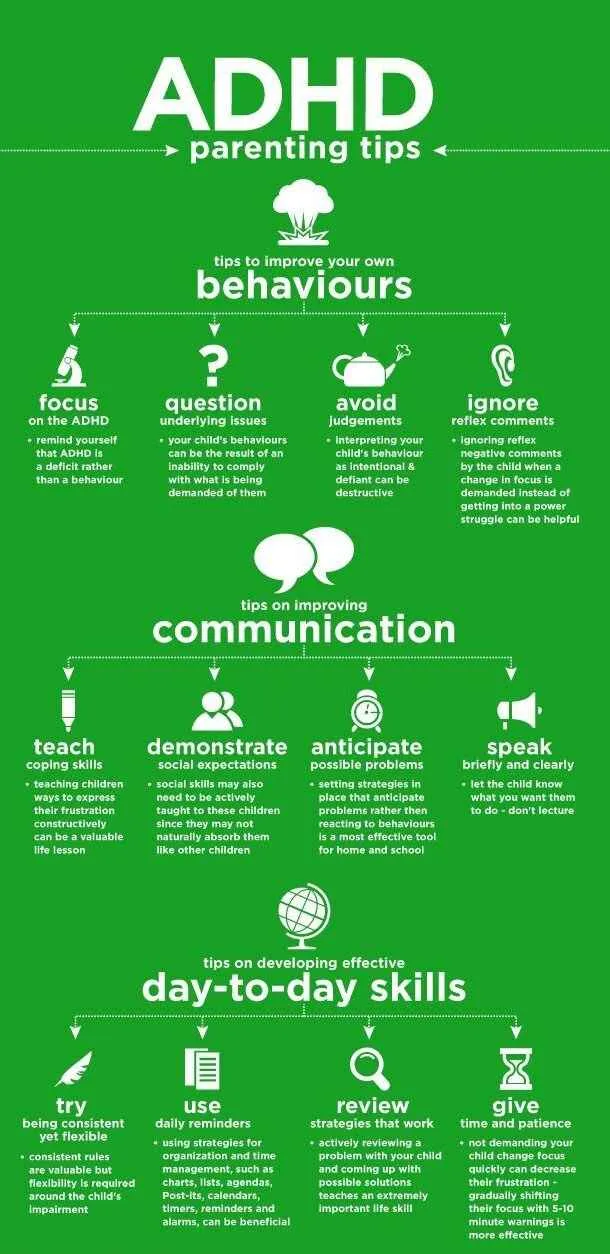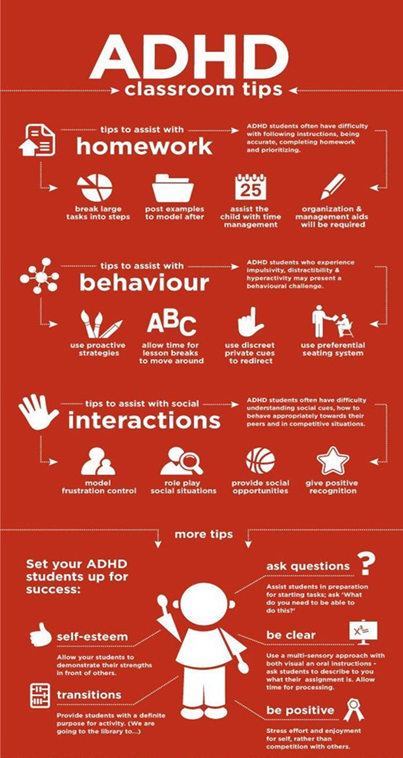


ADHD (Attention Deficit hyperactivity Disorder) is a neurological condition which affects an individuals behaviours including impairments to: concentration, memory recall, hyperactivity, attention and impulsivity.
There are 3 types of ADHD; Inattentive, Hyperactive and also a combined type.
ADHD affects both males and females, although currently the ratio of males to females is around 3:1 but in recent times, diagnosis of females has risen due to more awareness of the condition.
Decades ago, ADHD was seen as a condition that affected only young boys and that children would grow out of when they reach adolescence. Research has taken place over recent years, to show the preconceived perception of a childhood condition is no longer the case and it is now known that ADHD is a condition that occurs throughout childhood and adulthood.
The main methods of treatment for the condition is medication, therapy, behavioural management and CBT. Although this is a condition that can not be cured, a combination of medication and therapy can help an individual to manage the condition.
Assessments are carried out by psychiatrists/psychologists specialising in ADHD, giving a diagnosis of the type of ADHD that the individual has. A treatment plan is then created depending on the individual, their medical history and their type of ADHD. Medication comes in the types of stimulants and non-stimulants and are prescribed based on the type of ADHD and the potential side effects that may occur. There are non -prescription medications that research has shown may help individuals with ADHD.
The ADHD brain is different to that of a non ADHD brain as the neurotransmitters that allow the brain to send signals are not accepted by the receptors in the brain (think of a claw machine trying to pick up toys, but the claw doesn’t open). Therefore, struggling to naturally absorb dopamine and other chemicals within the brain. As the brain does not take in the dopamine, there then becomes a lack of it in a person with ADHD thus then “dopamine seeking” to try and gain some of the reaction in the body that it is missing. Dopamine is typically associated with feelings of happiness and excitement. However, the impairment of being unable to retain dopamine in an ADHD individual have effects on: the working memory, impulsivity, hyperactivity and stress.
Throughout the website you can find more information on the condition including
This is a video from The Mini ADHD Coach (pages on Instagram and Facebook)
What Is ADHD? Finally Understand Attention Deficit Hyperactivity Disorder 🙌 - YouTube

ADHD can display differently in each individual. Individuals may be: inattentive, hyperactive or a combination of both. Although the condition contains “deficient in hyperactivity” this is not always the case for every individual and some traits will fall outside of what people have perceived as the “typical ADHD traits” being:
Quite the opposite of the stereotypical traits can occur in individuals, with very little awareness of other traits currently failing to exist. Below is a list of some of the lesser known ADHD traits, that may help people to identify some traits that they may have always exhibited but never been made aware that these in fact are traits of ADHD
When it comes to hyperactivity an individual may struggle to get started with task paralysis.
They may leave things until the very last minute (procrastination) and may struggle to organise tasks they need to carry out.

This is when an individual may feel a strong sense of injustice in a situation and may take it upon themselves (no matter how big or tough the situation is) to resolve the matter and to right the wrong.

Individuals may find that they have bouts of hyperactivity, being able to hyperfocus on a certain task, then meaning that they are unable to stop until that task is complete.
That could mean they spend hours fixating on learning anew skills, buying items required, failing to eat or to go to the toilet, miss appointments or essential daily tasks until the task is done.
They may then fail to have any interest in that subject what so ever after the task is done due to burn out.
Hyper fixation is not a trait that ca be turned on or off, so is usually seen is being quite an inconvenient trait.
Image from www.modernmindmasters.com


This is a trait that can be very debilitating for individual with ADHD. This trait can mean that a person gets incredibly upset or hurt if they have interpreted something that someone has said or a way they have reacted and interpret it as a negative response. It usually is not the case that an individual has actually rejected the individual with ADHD, but the RSD can make a person feel like every comments is aimed towards them. This can lead to individuals playing out conversation and every possible outcome before they have happened. Once a conversation is had they will replay the conversation, regretting things they have said, analysing what was said and trying to interpret another persons thoughts and feelings.
This is a trait whereby someone may automatically disagree with a point that has been made, regardless of whether or not they know that their point is neither valid nor correct. But will then be unable to back track and agree that what they have said is incorrect. Individuals are often interpreted with this trait as “difficult and argumentative”. Because a person with ADHD stress levels can be in a constant heightened state, due to the impact of ADHD on the nervous system, individuals can be short tempered and incredibly reactive. Both with words and physically. They may hit out when instantly reacting in a situation or may “blow up like a botte of pop” losing their temper and struggle to see the situation from another’s point of view. This may continue until they have given themselves sufficient time and space from the situation that has triggered them.


ADHD is though to have an ever evolving list of medical conditions that run alongside it. Research has found that due to the amount of stress on the nervous system due the ADHD, that this leads to other medical issues occurring. However, the 2 most common conditions that tend to occur with ADHD are anxiety and depression. This is why a large amount of individuals undiagnosed with the condition, as they are misdiagnosed with anxiety and/or depression. These co-occurring conditions can include:
touch (clothing, seating, bedding)
smells (strong smells or struggle to smell)
textures and taste (food)
light (bright lights)
sounds (overwhelmed by too much noise or need for noise in order to function)
A comorbidity is when an individual has both a mental health condition along with a substance/addiction issue. Individuals with ADHD not only tend to have other medical conditions that occur alongside it but also have substance and addiction problems that are caused due to ADHD issues. Such as problems with drugs (both prescription and non-prescription) and alcohol dependency.
Some traits noted in the traits section includes Oppositional Defiance Disorder (ODD) and justice sensitivity. This along with authoritarian issues and lack of natural dopamine absorption can be that one of the greater known impacts of an individual having ADHD can be that they can end up leading to a life of entangled with crime, that over time leads to prison sentences.
The amount of individuals with ADHD in prisons is still uncertain but has been thought at times to be up to around 60%, as those with ADHD are 2 to 3 times more likely to get into trouble with the law. With individuals seeking dopamine meaning they may have a tendency to: turn to drugs, consume excessive alcohol and break the law. The effects of oppositional defiance can lead to issues with the police and authority.
In the book “how not to murder your ADHD child” the author explains how when she worked in prisons, the impact that an ADHD diagnosis, along with treatment and medication can help to turn around the lives of ADHD criminals.

There are many different methods and tools that can be implemented, in order to help an individual with ADHD. Whether diagnosed, undiagnosed, medicated or unmedicated there are different tools that can be accessed to cater for the needs of those with the condition.
Upon diagnosis an individual will be offered medication. There are also therapies and coaching that can be accessed to help give a person with ADHD the mental support that they need to help them to manage their condition and the traits that affect them most.
Individuals need to assess what their triggers are, in order for them to be able to gain the best type of support and to create their own toolbox.
Local ADHD coaches/ counsellors and therapists are available in most areas. These tend to be at a cost but in some areas, the NHS may have local services that they offer (check with your local GP).
There will also be online help from professionals that can be accessed through online searches and forums/groups for individuals just wanting to reach out to those with similar experiences. Some of these can be found on the online help section.
Individuals may find that understanding the condition better helps them to internally separate out what is an ADHD trait and what is not. Therefore, being able to give themselves some compassion when it comes to traits they find they have no control over. Reading books, listening to podcasts, online forums and courses are all different ways of informing a person on ADHD and its traits (see other sections for more information on these).
Physical items:
Activities/apps/organisation help:
THIS IS ESSENTIAL FOR THOSE WITH ADHD! Out of all of the tools, this is the most important one. ADHD can make an individual run like a motor. Never stopping, never taking time for themselves, running into burnout, making themselves poorly, high anxiety levels and running down their immune system. You must make time or allocate a set time each week/ every 2 weeks for yourself. Whether that be a walk on your own, time to sit and journal, time to dance to your favourite music in the kitchen, to take yourself out for coffee and cake or to go to the gym.
Allowing yourself to be in your own mind, with your own thoughts is something that rarely happens in those with ADHD. Giving yourself that time to run through the past week/day/month, notice things/ situations that may have triggered you and how to avoid that in the future. To acknowledge how something has made you feel and if there is something that you can do to change it. Are there ways you could have reacted, situations you have found yourself in and realised these have occurred because of ADHD traits. Then give yourself come compassion in knowing that you couldn’t have done anything to change that. That sometimes it’s the ADHD in the mind that has reacted that way, made that decision, said something you didn’t like and forgive yourself for it.
Because sometimes the biggest burden and impact of ADHD is the way the individuals beat themselves up about things that they just have no control over.

There has been a lot of research into different nutrients and supplements that can have a positive effect on some of the brains functions. Below is a list of different supplements, that research has suggested can help with those areas of the brain the are mostly affected by ADHD:
Additudes (online resource) information on supplements and vitamins that can help can be found on this link
Dirty laundry - https://amzn.eu/d/g4eW0lB
How not to murder you ADHD child - https://amzn.eu/d/giuzFAj
Step by Step Help for ADHD children - https://amzn.eu/d/dAMdMRk
Below are a few podcast that have good reviews (mainly female related) but there are many more relating to parenting, professionals and males on Spotify and Apple podcasts:
Chris Packham (on Autism)
Christine Mcguiness (Autism)
Adhd Staffordshire support, Pegis (closed group),
Adhd foundation, Adhd_untangled,
The.neurodivergentcollective,
The_mini_adhd_coach,
ADHD UK, Additude
Online information regarding ADHD events, webinars, video, forums and much more comes in a great variety now meaning that whatever type of information you require, is accessible at all times. This can mean opening opportunities to meet other with the condition at support group, attending events intended to inform and welcome those with ADHD. Accessing webinars that give help, support and information on ADHD as a whole or specifically on certain traits.
Eventbrite - continually have events running all over the country and online, happening through out the year
City of Stoke-on-Trent, United Kingdom Adhd Events | Eventbrite
ADHD Foundation – everything you could need regarding information on ADHD. From information for parents and children, for teachers and professionals, current research and findings, to information on the conferences that they run
https://www.adhdfoundation.org.uk/
Ted talks - these are videos/recording from professional speakers on all topics including mental hep and specifically ADHD.
Jessica McCabe: This is what it's really like to live with ADHD | TED Talk
ADDitude – this is an online magazine and information point aimed at people with ADHD and for those who work with individuals with ADHD . This is great as all articles are current and updated as research is being carried out.
ADDitude - ADD & ADHD Symptom Tests, Signs, Treatment, Support (additudemag.com)
Other useful sites include:
https://www.mind.org.uk/information-support/tips-for-everyday-living/adhd-and-mental-health/
https://www.youngminds.org.uk/young-person/mental-health-conditions/adhd-and-mental-health
Available online (link below) is an example of training ran by the NHS for information on ADHD to their professionals. This is a great resource to give a brief overview of the condition and hep other to understand how it affects individuals with ADHD.
https://www.england.nhs.uk/north-west/wp-content/uploads/sites/48/2019/03/Training-for-specialist-ADHD-teams.pdf
Open University
This is a free online course. That requires no questions to be answered, is more of an informative course and loos into a neurodevelopmental and impact side of the condition.
Understanding ADHD - OpenLearn - Open University
Kings College London – Understanding ADHD course
This one comes higher recommended and I feel is the most up to date of the courses. It looks at both the children and adult sides of the condition, as well as covering both males and females. It looks at current research and how things are progressing when it comes to acknowledging the condition and how the ADHD brain functions.
The information is released on section each week and there is a 4 week deadline. After which the information is not accessible.
Understand ADHD - Online Course | King's College London (futurelearn.com)
Being a parent to a child with ADHD can be an incredibly tough task. Trying to decipher what is ADHD traits and what is not, trying to parent whilst understanding your child’s triggers can be extremely challenging and coping with the physical needs of an ADHD child can be both physically and mentally draining.
ADHD is a genetic disorder and tends to have been inherited from one or both parents. Meaning that an ADHD parent may be parenting an ADHD child, adding more tension and stress to the situation. Parents (as do children) can be triggered by certain noises, words, sounds etc and these can often be produced by the ADHD child. Without the correct support add strategies being put into place, an ADHD household can be an incredibly stressful place to be.
Whilst waiting (or having had failed attempts) at gaining help and support from local children’s services, there are a few other things that parent can try to access and implement whilst waiting for professional support.


Books for teachers
When children are referred for an ADHD assessment through CAMHS, they then provide the parents with material on the New Forrest programmes courses. The 6 step programme that this is based on is from a book called “Step by Step help for ADHD Children. This book can be purchased online and may help school to implement strategies and methods to manage, help and support those children with ADHD. ) https://amzn.eu/d/dAMdMRk
Another book that may be helpful for teachers and professionals working with ADHD children is “teachers how not to kill the spirit in your ADHD kid”. This is written by Sarah Templeton, an author that also wrote a similar book aimed at parents. Helping to give them a better understanding of the lesser know ADHD traits, how not to react and how to react when those traits are displayed. Sarah has ADHD herself and has worked in numerous roles, including in prisons, helping individuals to manage their ADHD ad to avoid re offending. https://amzn.eu/d/f2F845K
Some of the lesser known traits in an ADHD child:
· Constant need for re-assurance
· Needing to achieve the best in ll they do
· Sensory issues – this may be that you notice they wear their socks inside out, wont wear a coat with their jumper,
· isn’t very affectionate with friends
· Can appear to be very “bossy” or the “class clown”
· Gets very excited when they talk and has a loud voice
· Talks over other when they are talking
· Struggles to wait their turn
· Loses their temper very easily
· Can complete work and has the ability to, but needs to see an example first (this will be continual through that subject)
· With perfectionism do they always strive to be the best, the highest score, the quickest?
· Masking- see if they tend to mimic other children
· Do they role play – tend not to?
· Do they talk in a loud, fast pace way and tend to get very passionate about things? (the class clown or the loud girl)
· Do they get really hyper focused on one subject/idea/event and continually talk about.
· Do they struggle to follow any instructions past the first one or two? can seem very bright just either get distracted/daydream or struggle to recall something previously learned. Can they have a sperate book with an example in for recall?
· Do they have sensory issues with clothes? Do they not wear under wear, constantly fidget with clothes?
· Get frustrated and lash out very easily? struggle to say sorry?
· Are they quite hands on with friends?
· Do they make random noises, squeaking or making noises at themselves?
· Do they have other conditions like dyslexia, dyscalculia or dyspraxias (dozy, falling, bumping into things, hurting themselves?)
· Do they swing their legs, sit with their legs up?
· You may also spot traits in parents. Parents may be late, disorganised, not doing homework, reading, spellings.
· Do they have any other co-occurring conditions such as dyslexia, dyspraxia (balance, grip, clumsiness issues), dyscalculia or Autism?
Management techniques
Don’t put near friends, don't put at the back of the room where they can be distracted.
Give them the opportunity to go and have a walk around.
Give feedback – as with need positive praise and reassurance
Be conscious if they are trying to people please and impress as may be going down the route of perfectionism
Certain words and phrases can trigger oppositional defiance disorder in ADHD children. This means the tone of a voice or certain words at the start of a sentence will instantly irritate a child
Whilst they are working, could they put on headphones to reduce the noise and the chance of distraction?
Whilst sitting exams can they go into a quite room/where headphone to reduce the chance of any sensory triggers?
Do not restrict any form of physical activity as a punishment.
https://www.rolemodels.me/news/how-to-support-my-child-managing-perfectionism








